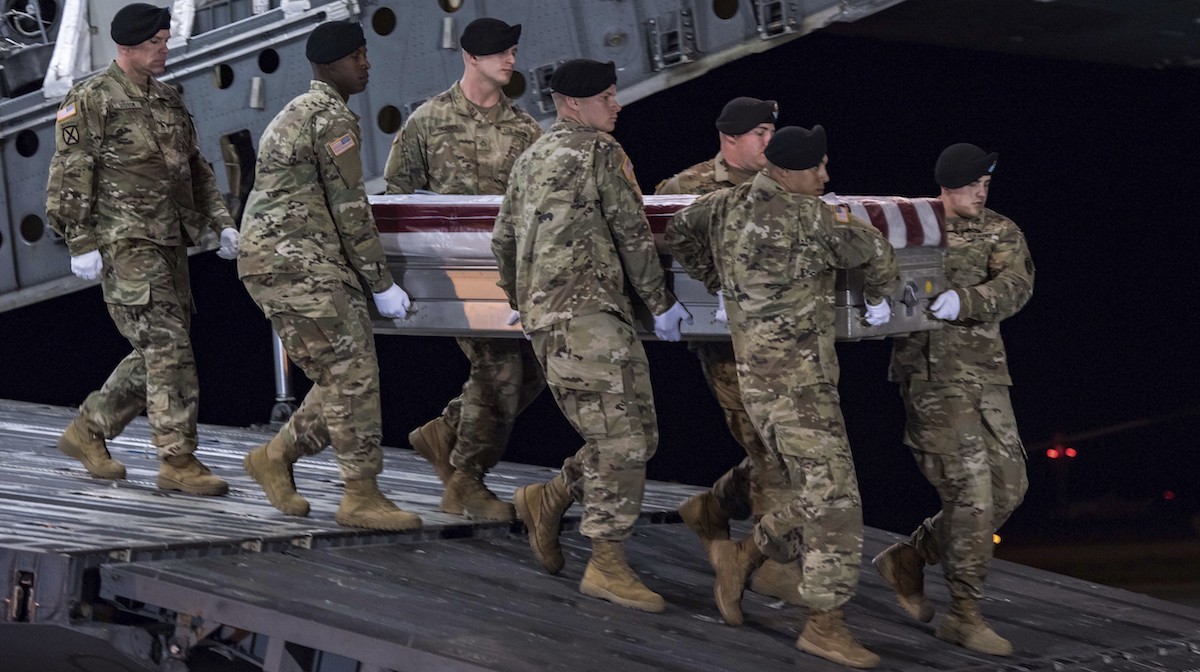Amid alleged controversial calls and fake Facebook posts, some serious questions are getting lost in the news cycle swirl: What happened in Niger that resulted in the death of four members of the U.S. military? And what were they even doing there in the first place?
Videos by Rare
Confusion and conflicting accounts about the incident abound.
- Details on the incident that left four American soldiers dead are tough to come by and there are many conflicting accounts.
- Verifiable information so far is that at least 12 U.S. soldiers from the Army’s 3rd Special Forces Group were accompanying about 30 Nigerien troops on a diplomatic mission near Tongo Tongo on Oct. 4. After meeting with local leaders, they were ambushed by about 50 unknown militants. A firefight broke out. Within roughly 30 minutes, French fighter jets were on the scene but did not engage with the fight on the ground.
- Afterwards, the remains of three U.S. soldiers were retrieved: Staff Sgts. Bryan Black, Jeremiah Johnson, and Dustin Wright. Somehow, Sgt. La David Johnson was separated from the rest of the group; it took another 48 hours to recover his body.
An investigation is underway.
- The conflicting reports of what happened on the ground that day are the subject of a major Pentagon investigation.
- Opened last week but expected to remain classified even once it is complete, The New York Times reports that so far, the inquiry has created more questions than answers because American and Nigerien soldiers on the patrol have given conflicting accounts about whether they were simply ambushed or were attacked after trying to chase Islamic insurgents.
Some members of Congress say they don’t have answers. But others do.
- “I didn’t know there were 1,000 troops in Niger,” Sen. Lindsey Graham (R-S.C.), told NBC’s Chuck Todd on Meet the Press Sunday. “They are going to brief us next week as to why they were there and what they were doing.” Senate Minority Leader Chuck Schumer told Todd the same thing.
- But others — particularly those who oversee the Pentagon’s funding — say the opposite. Rep. Charlie Dent (R-Pa.), who is on the appropriations committee, and Oklahoma Republican Rep. Steve Russell, a member of the government oversight and reform committee both said they are better informed about U.S. military operations in Africa than some of their colleagues. “We have a presence there,” Dent told CNN Sunday. “Not just there, but within that whole Lake Chad region, supporting local troops to support fight Boko Haram, support operations in West Africa and the operation in Mali.”
The U.S. military presence in North Africa is not new.
- Even though the U.S. mission there isn’t talked about much, Niger and its neighbors, Chad and Mali, have been considered crucial in the global war against terror for a decade.
- In February 2013, President Barack Obama added 40 troops there to facilitate intelligence sharing with French forces there. The move took the number of Americans deployed there to about 100.
- Since then, that number has increased to between 800 and 1,000 U.S. troops in Niger, according to reports, all helping in the fight against Al Qaeda, Boko Haram, and ISIS. Most of them are there to help stand up a second air base to be a home for unmanned, intelligence-collecting aircraft.



